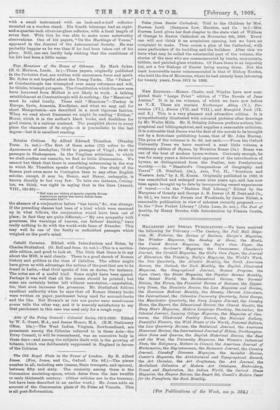Notuicie Criticae. By Alfred Edward Thiselton. (Stanley Press. ls. net.)—The
first of these notes (72) refers to the Agamemnon of Aeschylus; 73-83 to passages of Virgil ; 84-88 to passages in Shakespeare. In the Virgilian criticisms, to which we shall confine our remarks, we find no little illumination. We cannot but think that there is something unbecoming in the way In which Mr. Thiselton speaks of Conington. Our study of the Roman poet owes more to Conington than to any other English scholar, except, it may be, Henry, and Henry, unhappily, is known directly to but very few. To take one instance, Coning- ton, we think, was right in saying that in the lines (Aeneid, VIII., 181-83)— " Sod mea me virtue at eanota nmeula divum eognatique patres tua Mule dIdita fame etugunxere LIM "— the absence of a conjunction before " tua terris," dm., was strange. If the preceding clauses had been of a kind which were summed up in what follows, the conjunction would have been out of place; in fact they are quite different,—" My own sympathy with greatness, the warnings of heaven, our fathers' kinship," have really nothing to do with the world-wide fame of Evander. This may well be one of the faulty or unfinished passages which weighed on the poet's mind.









































 Previous page
Previous page